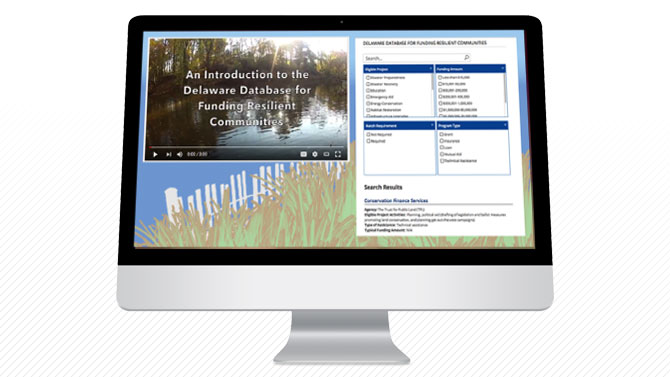


‘ONE-STOP SHOP’
June 02, 2016
DNREC, UD create database to support resilient communities
Climate change impacts are a growing concern for Delaware’s municipalities and communities, and local governments often wonder where they can find funding to help them adapt to or combat threats of severe weather events and enhance resiliency against climate change and sea level rise.
With the unveiling of a new database developed by the University of Delaware’s Institute for Public Administration (IPA), with financial support from the Delaware Department of Natural Resources and Environmental Control (DNREC) Delaware Coastal Programs, local governments and communities now have a resource to help them identify potential funding.
Financial assistance programs are available to support implementation of projects to prepare for and adapt to these severe weather threats and climate change, but the programs and resources allocated by them can be difficult to find and often go unknown about or unused. Until now Delaware municipalities might have missed out on opportunities to claim a share of these resources in the fight for resiliency against the impacts of climate change.
But with support from DNREC’s Delaware Coastal Programs, graduate student Gemma Tierney and undergraduate student Nikki Golomb worked with post-doctoral researcher Philip Barns to conduct an exhaustive search of programs that financially support implementation of resiliency projects in Delaware. This information has been compiled into an accessible and intuitive online searchable database to benefit the state’s towns and communities.
“Our intention in partnering with the university was to make it easier for municipalities in our state to find funding that will help enhance the resilience of their communities,” said Sarah W. Cooksey, administrator, Delaware Coastal Programs. “In creating the database, we made a one-stop shop for municipal leaders to find appropriate assistance that can fund projects to protect their community infrastructure, citizens’ private property and natural resources in the face of climate change impacts.”
While planning and technical assistance programs were identified and included, IPA’s search prioritized financial assistance programs that support the implementation of high-cost activities such as infrastructure improvements, facility retrofitting, construction and land acquisition, she said. Database users can also use a quick sorting feature to filter programs by type of assistance offered (grant, loan, etc.), project scope (land acquisition, energy efficiency retrofits, etc.), amount of financial assistance available, and whether or not matching funds are required.
"This database is a great tool for Delaware municipalities looking to fund resilience-building projects in their communities,” said Jerome Lewis, director of IPA. “Many jurisdictions need financial assistance to upgrade their infrastructure and make the necessary adaptations. This user-friendly database of funding opportunities greatly facilitates those efforts."
The easy-to-use website lists resources that support implementation of climate change adaptation and resilient community development in the following categories:
• Disaster preparedness
• Disaster recovery
• Education
• Emergency aid
• Energy conservation
• Habitat restoration
• Infrastructure upgrades
• Planning
• Property acquisition/ easements
• Renewable energy
• Species protection
• Storm-proofing retrofits
• Stormwater management
• Vulnerability assessment
• Wetland protection
Online access
The Delaware Database for Funding Resilient Communities can be accessed from any computer, tablet or mobile device at www.sppa.udel.edu/research-public-service/ddfrc
YouTube tutorial
This three-minute video provides step-by-step instructions for using the search tool.
Contact Us
Have a UDaily story idea?
Contact us at ocm@udel.edu
Members of the press
Contact us at 302-831-NEWS or visit the Media Relations website

